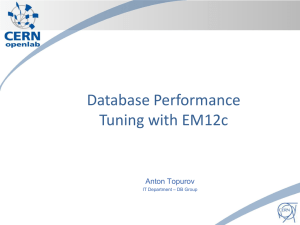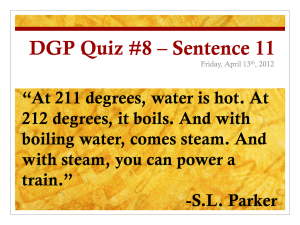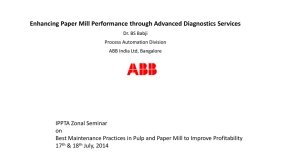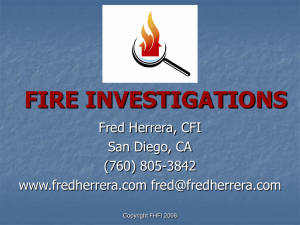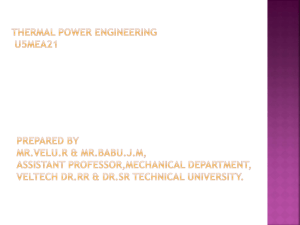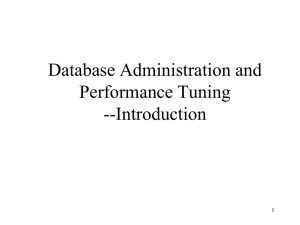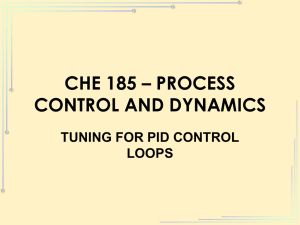Presentation Title
advertisement
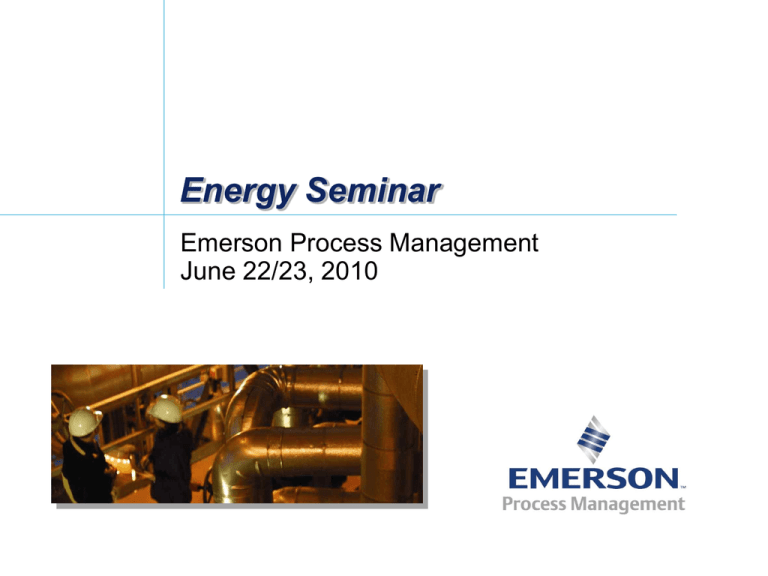
Energy Seminar Emerson Process Management June 22/23, 2010 Process Control Fundamentals Kurt Schmelzer & Tom Marsh Novaspect, Inc. Process Control Applies… Process Steam Drives Purchased Steam Purchased Fuel Central Steam / Water Production Export Steam Process Heating/ Cooling Water Process Steam Generated Process Fired Equipment Raw Material as Fuel Export Fuel Central Power / Air Production Utility Plant Purchased Power Process Direct Fuel Usage Process Misc. Electric / Air Usage Export Power Process Electric Drives Site Processes Causes of Variability Loops Loops Increases Increases Variability Variability As Many As 80% of Loops Actually Increase Variability 20% Design Design Design 30% Tuning Tuning 30% 20% Source: Entech---Results from audits of over 5000 loops in Pulp & Paper Mills The Cause The Cause Control ControlValve Valve Performance Performance SUPERHEAT TEMP. Main Steam Temperature Control Decreased Variability = Increased Profit Upper Limit NPHR = 0.75% Reduction Set Point Increased Temp. Set Point Reduced Process Variability Provides the Opportunity for Setpoint Change = ( NPHR) X Fuel cost X KW-HR generated/year = Savings = .75% x 11,000 BTU/KW-HR X $2.22/MM BTU X 320,000 KW X 8760 hours / year = $516,517 per operating year !! The Energy Improvement Process Begin Survey and Measure Implement Site Management Optimize Unit Processes Fix Devices and Loops Address Equipment Practical Process Control Basics of Process Control Keys for Boiler Control Keys for Chiller Control Basics Measurements Final Control Elements Controller Control Strategy Correct for application Correct for application Set-up and Tuning Designed to the system Basic Controls Can Save Energy Upper Limit Set Point Increased Set Point Lower Limit What is the key to capturing the performance of measurements and final control elements STRATEGY & TUNING Boiler Control Boiler Control Measurements Keys Drum Level – Accuracy, and Reliability Fuel Flow – Repeatability, and Reliability Air Flow – Repeatability, and Reliability Flue Gas Oxygen – Accuracy, and Reliability Steam Flow – Accuracy, and Reliability Feedwater Flow – Accuracy, and Reliability Boiler Control Controller Keys Controller/s capable of handling the highly interactive boiler process – Fast enough to unlock the performance for the measurements and final control elements. Typical 0.5 Sec. – Digital Resolution equal to the field instrumentation 32 Bit floating point required Energy Saving Control Strategies Stack O2 Trim Ensures you maximize energy savings Tuning Tuning – Coordinated Lambda Tuning – Cross Limit Effect Boiler Control Tuning Open Loop Bump Testing – Air & Fuel are Self Regulating Processes • Maximize Speed of Response • Improve performance by coordinating response to maintain fuel/air ratio through load changes • Optimize to lower O2 as control improves. – Understand what your O2 reading Represents. – Determine CO Limits – Feedwater Flow is a Self-regulating Process • Maximize Response as this is the inner loop – Drum Level is an Integrating Process • Average of Several Slopes to get best response. Chiller Plant Overview Chiller Overview Cooling Towers Sequencing Chiller Control Measurement Keys Temperature – Accuracy, and Reliability Temperature – Accuracy, and Reliability Temperature –Accuracy, and Reliability Water Flow – Accuracy, and Reliability Key Final Control Elements Compressor Guide Vane Actuator Child Water Flow Refrigerant Level Temperature Control Tuning Open Loop Bump Testing – Self Regulating Process or Near Integrating Process • Ensure self regulating process has reached final temperature • Improve performance by treating as integrating process Dead Time – Chiller on-board loops should have relative short dead-time – System loops may have significant dead-time • Dead time approach – PID, Model Predictive, Smith Predictor Sequencing – Control of the Various Redundant Systems Optimization is a Building Process Sustainable Business Results Are at Risk if a Holistic Approach is Not Utilized Optimize Unit Process SOP Tuning Math and Model Adjustment Control Platform and Single-Knob Automatic Regulatory Process Measurement Address Equipment Process Actuation Process Issue Resolution / Mitigation Fix Devices and Loops Single Knob - Control Attention to fundamental are the keys. Robust fundamental controls are the foundation to energy management solutions. The Takeaway Ineffective controller tuning is the biggest single contributor to poor control loop performance and energy waste …stay focused on Loop Tuning!
